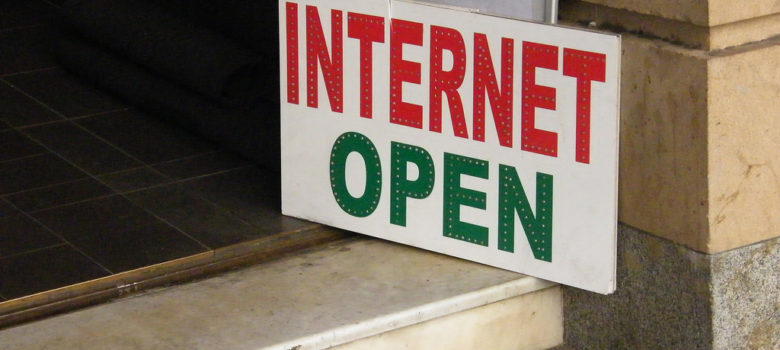This week’s announcement that the U.S. telecommunications regulator plans to roll back net-neutrality regulations sparked an immediate backlash from those who fear that the decision will turn the Internet into a cable-like service dominated by the carriers and deep-pocketed giants that can afford to pay new fees to keep their content on the fast lane.
My Globe and Mail op-ed notes that the U.S. order, which would also block states from carrying out their own versions of policies that stop telecom carriers from leveraging their gatekeeper status by treating similar content or applications differently, is set for a vote next month.
Abandoning net neutrality will have an impact in the United States since evidence suggests that, without net neutrality rules, carriers will pick winners by differentiating connectivity based on the willingness of Internet companies, sites and services to pay additional fees. The experience in countries without net neutrality rules bears this out. Some European countries feature pricing plans that look like cable packages with limited access to a select group of websites or Internet services. On the flip side, European data show that providers that rely on neutral services offer better prices and larger data allowances.
From a Canadian consumer perspective, the effect of the U.S. decision will be more indirect. What separates the Canadian net neutrality approach from the U.S. direction is that consumers and creators – not telecom companies or Internet service providers (ISPs) – are in control when it comes to Internet usage.
Unlike the United States, Canada has emerged as a world leader in supporting net neutrality with clear endorsements from both political leaders and the Canadian Radio-television and Telecommunications Commission. Navdeep Bains, the federal Minister of Innovation, Science and Economic Development, responded to the U.S. developments by affirming that “Canada will continue to stand for diversity and freedom of expression. Our government remains committed to the principles of net neutrality.”
Canadian Heritage Minister Mélanie Joly has similarly emerged as a notable proponent of net neutrality. Despite pressure from some cultural groups to abandon net neutrality by mandating preferential treatment of Canadian content, Ms. Joly has affirmed that the principle remains at the core of Canadian cultural policy, saying in September that “we will continue to champion the Internet as a progressive force and an open space without barriers. As a government, we stand by the principle of net neutrality.”
The Canadian commitment to net neutrality has been similarly endorsed at the regulatory level. The foundation of Canadian policy lies in several CRTC decisions that restrict practices such as managing Internet traffic to limit speeds for some applications or creating pricing plans that “zero rate” certain content that does not count as part of monthly data-consumption caps. Moreover, Canadian law features clear safeguards against unjust discrimination, undue preferences or controlling the content of communications.
While the change in U.S. administration has led to a dramatic shift in net neutrality policy, the same will not occur in Canada. New CRTC chair Ian Scott told an industry conference earlier this month that “as companies continue to innovate in their offerings to Canadians, the CRTC will continue to ensure that Canada’s Internet neutrality provisions are respected … the owners and operators of the country’s communications may not discriminate against content based on its origin or destination.”
Canadian consumers may be shielded from net neutrality abuses, but the effects of the U.S. decision may still be felt north of the border. Since Canadian Internet traffic often transits through the United States, there are concerns that Canadian data could get caught by non-neutral policies. Moreover, Canadian internet services hoping to attract U.S. customers may face demands for payments to have their content delivered on the fast track. Since the renegotiation of the North American free-trade agreement include a chapter on digital trade, Canadian negotiators should be pushing for the inclusion of a strong, enforceable net neutrality provision.
The United States has been a remarkably innovative country for Internet services with the vast majority of leading companies starting there before venturing abroad. It is striking how those companies – Google, Netflix, Twitter – remain ardent supporters of net neutrality, effectively acknowledging the debt they owe to rules that helped them to become household names around the world. Without U.S. net-neutrality safeguards, the range of choices that ultimately make their way onto the consumer and business landscape may be curtailed, a discouraging development that will affect everyone.








Thank you for an insightful article, but to suggest that we are “shielded from net neutrality abuses” is only correct within a very narrow concept of neutral.
For example, I just now went to the CBC web site and thought I might click on a video clip there. I got a message saying “Episode available within Canada only”. Putting aside for the moment that I am a Canadian who is currently in Canada, and has lived here for sixty years, there is no reason why the CBC should discriminate on the basis of IP nor make assumptions about someone’s location based on such. The CBC obviously doesn’t subscribe to the concept of net neutrality.
Not sure Geo Blocking and Net Neutrality are the same thing
Pingback: This Week’s [in]Security – Issue 35 - Control Gap | Control Gap
why is the United States so determined to ruin the internet for everybody?
Pingback: Monday Pick-Me-Up « Legal Sourcery
Pingback: Dec. 4th – Gemini Full Moon has passed | Chaos and Reason
Pingback: The Donald Trump War on Science: Save Net Neutrality! | Confessions of a Science Librarian
Not sure Geo Blocking and Net Neutrality are the same thing